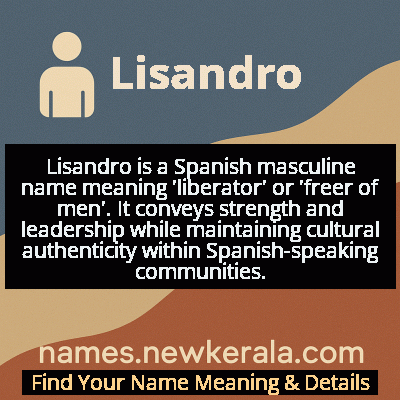Lisandro Name Meaning & Details
Origin, Popularity, Numerology Analysis & Name Meaning of Lisandro
Discover the origin, meaning, and cultural significance of the name LISANDRO. Delve into its historical roots and explore the lasting impact it has had on communities and traditions.
Name
Lisandro
Gender
Male
Origin
Spanish
Lucky Number
2
Meaning of the Name - Lisandro
Lisandro is a Spanish masculine name meaning 'liberator' or 'freer of men'. It conveys strength and leadership while maintaining cultural authenticity within Spanish-speaking communities.
Lisandro - Complete Numerology Analysis
Your Numerology Number
Based on Pythagorean Numerology System
Ruling Planet
Moon
Positive Nature
Diplomatic, friendly, artistic, empathetic.
Negative Traits
Over-sensitive, moody, indecisive, prone to self-pity.
Lucky Colours
Green, cream, white.
Lucky Days
Monday.
Lucky Stones
Pearl, moonstone.
Harmony Numbers
1, 3, 4.
Best Suited Professions
Diplomats, mediators, caregivers, artists.
What People Like About You
Cooperative spirit, friendliness, artistic talent.
Famous People Named Lisandro
Lisandro López
Footballer
Successful Argentine striker who played for top European clubs and the national team
Lisandro de la Torre
Politician
Founder of Democratic Progressive Party and prominent anti-corruption figure in Argentine politics
Lisandro Aristimuño
Musician
Influential Argentine singer-songwriter known for blending folk traditions with contemporary sounds
Lisandro Alvarado
Physician and Scholar
Renowned Venezuelan intellectual who contributed significantly to medicine, history, and linguistics
Name Variations & International Equivalents
Click on blue names to explore their detailed meanings. Gray names with will be available soon.
Cultural & Historical Significance
Extended Personality Analysis
People named Lisandro are often characterized by their strong leadership qualities and strategic approach to life's challenges. They tend to be analytical thinkers who carefully consider their actions while maintaining the courage to take decisive steps when necessary. Their inherent sense of justice and fairness often drives them to advocate for others, making them natural protectors and reformers. The combination of intellectual depth and practical action in Lisandros creates individuals who are both dreamers and doers—able to envision better futures while possessing the determination to make them reality. They typically exhibit loyalty to their principles and to those they care about, though this can sometimes manifest as stubbornness when their convictions are challenged. Their charismatic nature often draws others to them, and they tend to excel in positions where they can guide, teach, or lead. The name's historical weight seems to inspire those who bear it to live up to its legacy of liberation and strategic excellence.
Modern Usage & Popularity
In contemporary naming practices, Lisandro maintains a respectable presence across Spanish-speaking communities, particularly in Argentina where it has historical significance and cultural resonance. The name experiences periodic surges in popularity, often influenced by famous bearers in sports, music, or public life. While not trending toward mass popularity, it holds steady as a sophisticated choice for parents seeking a name with classical roots that remains distinctive without being obscure. Its usage spans socioeconomic classes, though it appears more frequently among families with higher education levels who appreciate its historical and linguistic depth. The name's international appeal has grown slightly with globalization, as its similarity to the English 'Lysander' makes it recognizable across cultures while maintaining its distinct Spanish identity. Current data shows stable usage patterns with slight increases in urban areas where classical names are experiencing renewed interest.
Symbolic & Spiritual Meanings
Symbolically, Lisandro embodies the powerful concept of liberation in its broadest sense—representing not just physical freedom but intellectual, emotional, and spiritual emancipation. The name carries the archetype of the strategic liberator, someone who plans carefully before acting to secure freedom for themselves or others. It symbolizes the transformation from constraint to autonomy, from ignorance to enlightenment, and from oppression to self-determination. In metaphorical terms, Lisandro represents the breaking of chains—whether those chains are external circumstances, limiting beliefs, or social injustices. The name also symbolizes the integration of wisdom and action, as the historical Lysander was known for both strategic thinking and military prowess. This dual symbolism makes Lisandro a name that speaks to the human journey toward greater freedom and self-actualization, representing the ongoing struggle for personal and collective liberation that transcends historical periods and cultural boundaries.

